ASTANA – It has been 25 years since the establishment of the National Commission for Women’s Affairs, Family and Demographic Policy in Kazakhstan. The institution made significant steps in the protection of women and children through hundreds of projects, going beyond its designated role as the advisory and consultative body under the President of Kazakhstan.
The Astana Times delved into the ongoing activities of the commission and its key achievements during the period of its existence, which allowed the state structure to evolve into a sought-after platform for dialogue among government authorities, civil society, and international organizations.
Legislative activities
The solid commitment of the Kazakh government to tackle gender-motivated discrimination in all forms is particularly driven by the commission’s efforts.
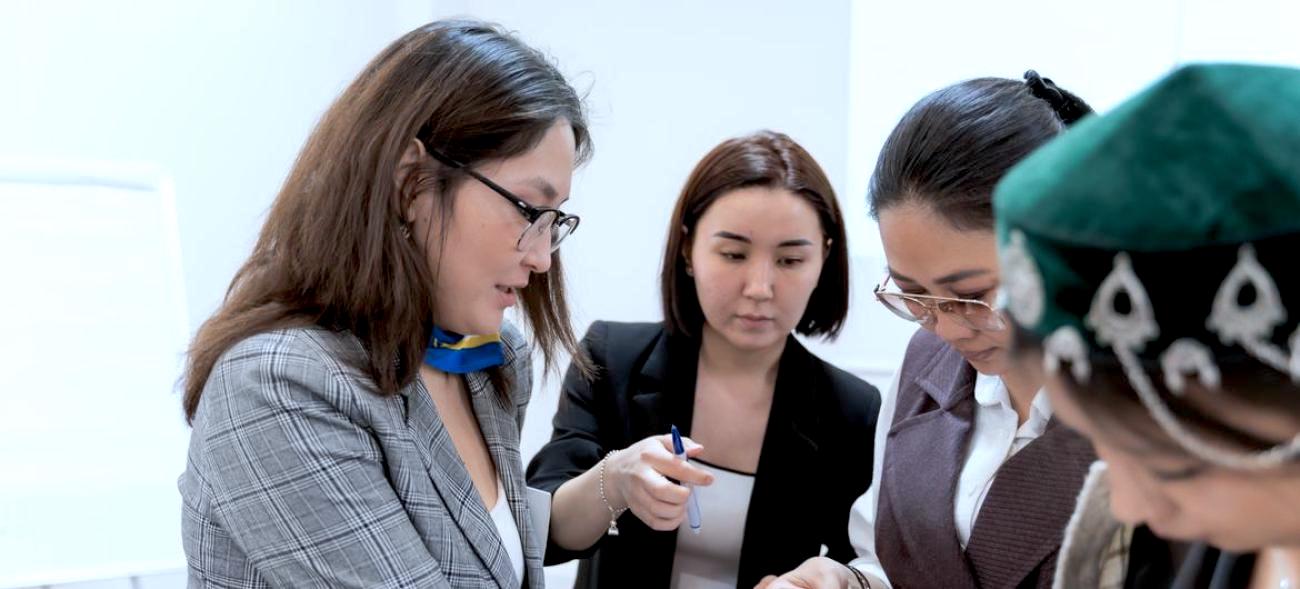
The Women Entrepreneurship Development Center in Kazakhstan. Photo credit: the United Nations Sustainable Development Group.
Kazakhstan has ratified the main universal conventions on gender equality, including the Convention on the Elimination of All Forms of Discrimination against Women (CEDAW), often referred to as an international bill of rights for women. Unlike other declarations, the document, which was adopted by the United Nations General Assembly (UNGA) in 1979, clearly defines the national action plan and establishes legally binding principles and standards for the realization of women’s rights.
Kazakhstan strictly adheres to international labor standards envisaged in eight fundamental conventions of the International Labor Organization (ILO). The country is a signatory to the four key ILO gender equality conventions: the Equal Remuneration Convention (1951), Discrimination (Employment and Occupation) Convention (1958), Workers with Family Responsibilities Convention (1981), and Maternity Protection Convention (2000).
In 2021, Kazakhstan also joined two Coalitions of Action of the Generation of Equality Forum, committing to combat gender-based violence and ensure economic justice and rights.
For the past year, the country has eradicated gender disparities in educational attainment and demonstrated advancements in economic and political opportunities. It now ranks 62nd among 146 countries in the Global Gender Gap, according to the World Economic Forum (WEF).
In her X account, the United Nations (UN) Resident Coordinator for Kazakhstan Michaela Friberg-Storey wrote that this achievement “would not be possible without joint work of all stakeholders – the government, the national commission, private sector, and civil society organizations (CSOs).”
The commission’s ample potential for the development of legal initiatives was especially observed in 2023.
Last year, its experts participated in the preparation of amendments to the Social Code, Administrative Offences Code, and the Criminal Code. The draft law introduced amendments and additions to some legislative acts to ensure women’s rights and children’s safety.
The beginning of the new year marked the approval of the commission’s new membership consisting of the seven key leading experts and public figures.
The head of the Shyrak Association of Women with Disabilities Lyazzat Kaltayeva, Secretary of the Amanat Party Sholpan Karinova, Samruk Kazyna Trust CEO Alfiya Aliyeva, Deputy Chairman of the Administrative Police Committee of the Ministry of Internal Affairs Renat Zulkhairov, the department director at KazMunaiGas Exploration Production Elmira Karimova, Maqsut Narikbayev University professor Muslim Khasenov, and the deputy of the Mazhilis (the lower chamber of the Parliament) Tilektes Adambekov joined the commission two months ago.
In a conversation with The Astana Times, Vice Minister of Information and Social Development Yevgeniy Kochetov called the commission a “unique institution.”
“The commission is, first of all, a consulting and advisory body along with other national commissions under the President. At the same time, it has outpaced the expectations and turned into an independent working structure, generating and implementing its own ideas,” he said.
“First, the members of the commission address a raft of legislative issues prior to their final submission. Secondly, they carry out a wide range of activities. Bypassing gender stereotypes, the commission draws attention to real problems, openly talking about them,” added Kochetov.
In Kochetov’s perspective, the male participation in the commission’s work is a “notable observation.” He also underscored the substantial impact of the projects bringing an example of the IT-Aiel initiative.
Projects in action
IT-Aiel provided 2,000 unemployed women with the skills to boost their income and achieve financial independence. Through comprehensive training, female representatives were equipped with the knowledge and tools necessary to thrive as freelancers on digital platforms.
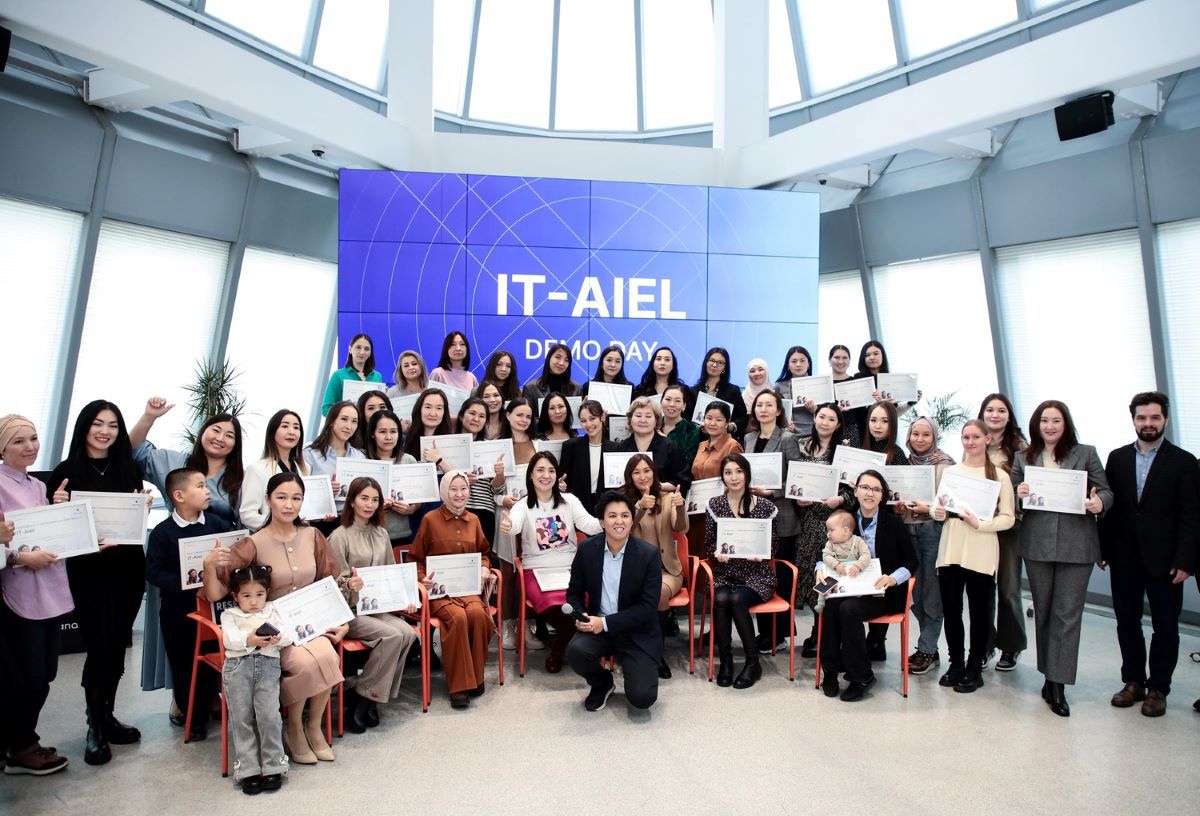
The IT-Aiel program included free courses, such as No Code School, Freelance School, and Computer Literacy Fundamentals. Photo credit: digitalbusiness.kz.
“When we first conceived this project, we couldn’t even imagine the scale of its impact and the results it would achieve,” said Alina Abdrakhmanova, the managing director of the Astana Hub International Technopark of IT startups, during the certificate award ceremony for 50 women, who completed the course with their own IT products on hand.
Five finalists presented their works in Astana. Diana Akhmetbayeva from the Kazakh city of Aktobe created the Welcome platform for social integration of immigrants. Another participant Diana Saulebayeva developed a website to promote domestic tourism. The MomSharing aid service for families with children was presented by Samal Kasenova. An Atyrau native Korkem Kasenova launched a website for an aviation training center. To enhance children’s financial, digital, and computer literacy, Aliya Orazymbetova worked out her own business project.
IT-Aiel was developed by the commission in cooperation with the Astana Hub, EPAM Systems, the global provider of software development services, and the Techno Women non-profit organization in Kazakhstan.
Another case in point is the Tomiris project on political leadership for women, which was carried out by the political management academy of the Amanat party in collaboration with the Kazakh Ministry of Culture and Information, the commission, and the Konrad Adenauer Foundation.
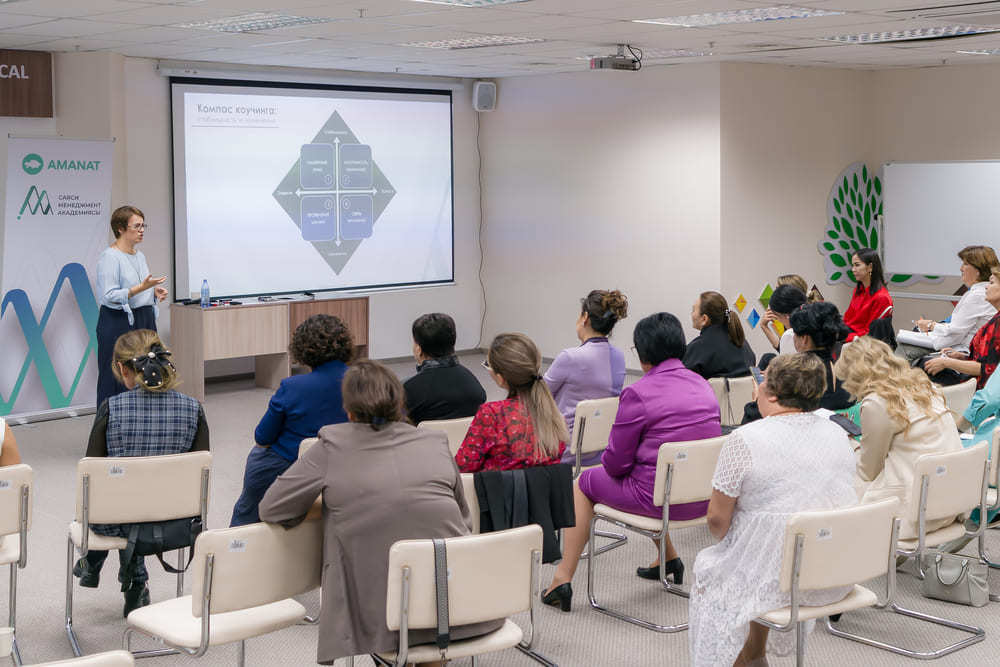
Photo credit: the Amanat party.
Overall, the competition committee considered 125 applications out of 342 requests and approved a list of 30 participants by open vote.
Female participants underwent courses covering leadership, gender issues in politics, law, emotional intelligence, project management, negotiation skills, and public speaking. The program included meetings with the Amanat leadership, deputies of the Mazhilis, and prominent political figures from Kazakhstan and Germany.
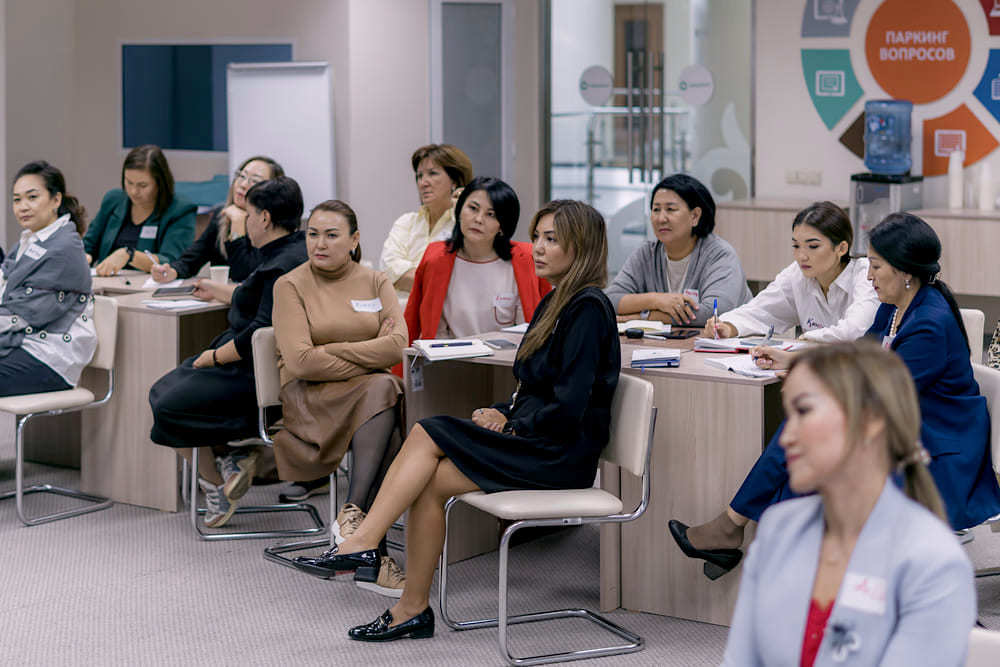
The Tomiris project on political leadership for women. Photo credit: the Amanat party.
“I particularly enjoyed the meeting with the deputies of the Mazhilis. The open dialogue with political leaders, who spoke about their life journeys, success stories, and work, resonated with me. Besides, the meeting with female politicians from Germany was a memorable event. They specifically arrived for the seminar-training through the Konrad Adenauer Foundation. It was a very enriching experience,” said Gulbakhsha Musabayeva, the project finalist.
Upon completion of the training, women developed political projects aimed at improving the socio-economic situation in their regions.
In cooperation with the Samruk Kazyna Sovereign Wealth Fund, the commission has been implementing seven socially valuable initiatives, including three charity projects.
One of them is the Salamatty Kazakhstan train project. It was launched to provide assistance to citizens living in remote areas and villages.
According to Kazakh Minister of Culture and Information Aida Balayeva, the chair of the commission, it is the first time when “the range of charitable aid and services offered to the population were substantially expanded with the support of the commission.”
“Alongside medical consultations and diagnostics, residents in remote areas received mediation, legal, and psychological support. The measures that we implemented resolved conflicts, addressed inquiries, and protected the rights and interests of citizens,” said Balayeva.
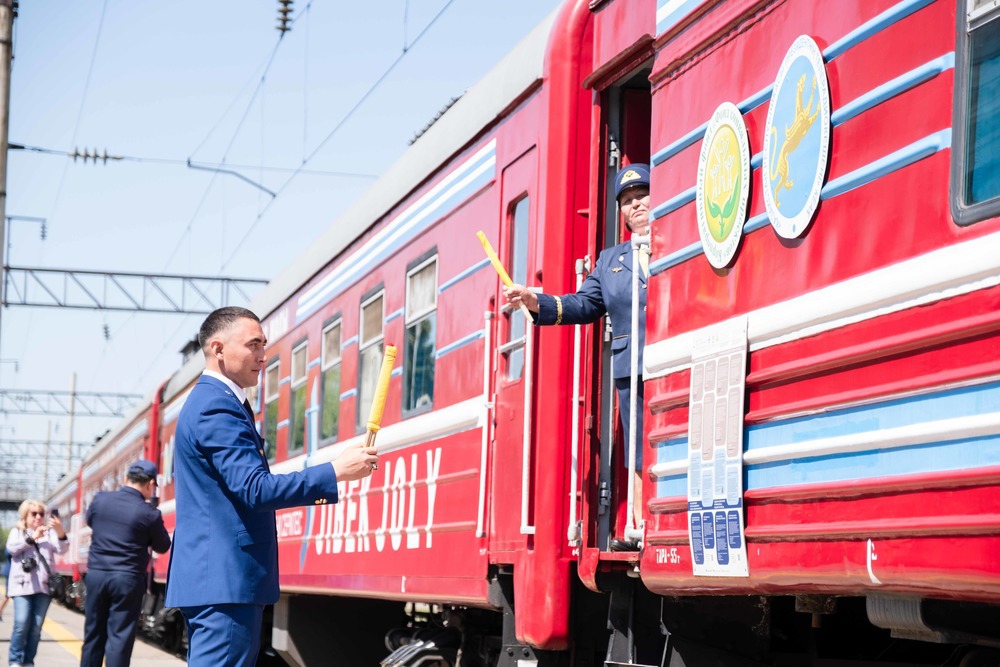
Doctors provide primary health care, consultations and examinations. In case of need, specialists carry out operations. Photo credit: Samruk Kazyna Trust.
In 2023, the commission institutionalized the practice of dispatching expert groups to the regions to hold in-person consultative meetings with the local population.
In total, the project has covered over 90,000 villagers. Professional mediators and lawyers have provided assistance to more than 9,000 citizens. From April 26 to Dec. 5 last year, the Salamatty Kazakhstan train project ran through 121 remote stations in 17 regions, according to the commission.

The medical brigade includes a therapist, surgeon, general practitioner, neurologist, ultrasound specialist, obstetrician, laboratory technicians, nurses, radiologist, and dental specialist. Photo credit: Samruk Kazyna Trust.
Today, Kazakhstan’s priority is to tighten responsibility for domestic violence. In this context, the commission experts initiated the One Stop Service project to offer free legal and psychological support to victims of violence. Under this program, 36 criminal cases involving women and children received support and 11 high-profile cases are now under special supervision.
By 2025, it is planned to open 234 family support centers in every district of the country, as well as psychological support centers in every region to provide timely assistance. From now on, victims of domestic violence will be able to shelter in family support centers, as they started to offer temporary accommodation.
Based on monitoring and expert analysis, the commission is also propelling a set of initiatives to enhance child safety in private preschools and summer camps. The common objective is to prevent harassment, bullying, and child suicide. In this regard, the Kazakh government is gearing up to localize KiVa, a Finnish anti-bullying program, and the Dos Bol national initiative.
Plans for 2024
Sholpan Karinova, one of the newly elected members, joined the commission on behalf of Kazakhstan’s ruling Amanat party, which boasts a 65% female membership. In an interview with The Astana Times, she covered some of the tasks set for this year.
The activities aimed at preserving the family institution, ensuring psychological safety of the society, and protecting the rights of women and children will be at the core of the commission’s work in 2024.
“First of all, we will focus on the family. This is a value, this is the foundation of our state. Therefore, our efforts will be directed at protecting the family institution. Special attention will be paid to developing a responsible attitude to the health of young citizens. This should be important not only for health authorities, but for the entire society,” said Karinova.
The next important area of work is psychological safety, according to her.
“The Amanat party has embarked on the development of a draft law on psychological activity. It is imperative for every citizen to feel social safety in the country. Our expert group continues to discuss legislative issues in cooperation with the society,” she said.
The commission will work for the protection of the rights of women and children. Their safety is a priority, noted Karinova.
“The President gave an instruction to toughen the punishment for the abuse of women and children. In this regard, the Amanat deputies and the Kazakh Parliament initiated the adoption of the law. The draft law is now under consideration in the Senate [an upper house of the Parliament],” she said.
“Another area of particular importance covers a wide range of issues related to children with disabilities. Unfortunately, their number is not decreasing. Healthy children and children with disabilities should communicate on an equal footing and achieve common goals. The purpose is to unite, and ensure the development of an inclusive society for these children,” she added.
Despite the existence of de jure equality, there is a discrepancy between formally established rights and the actual availability of equal opportunities.
As a case in point, recent sociological research on public perception of gender equality conducted by the United Nations Development Programme (UNDP) in Kazakhstan and the UN Women Kazakhstan revealed that 76.5% of citizens, both women and men, consider the gender situation in the country satisfactory, primarily due to entrenched stereotypes about socially conditioned gender roles.
Last week, the commission celebrated its 25th anniversary at a forum dedicated to female empowerment in Kazakhstan.
